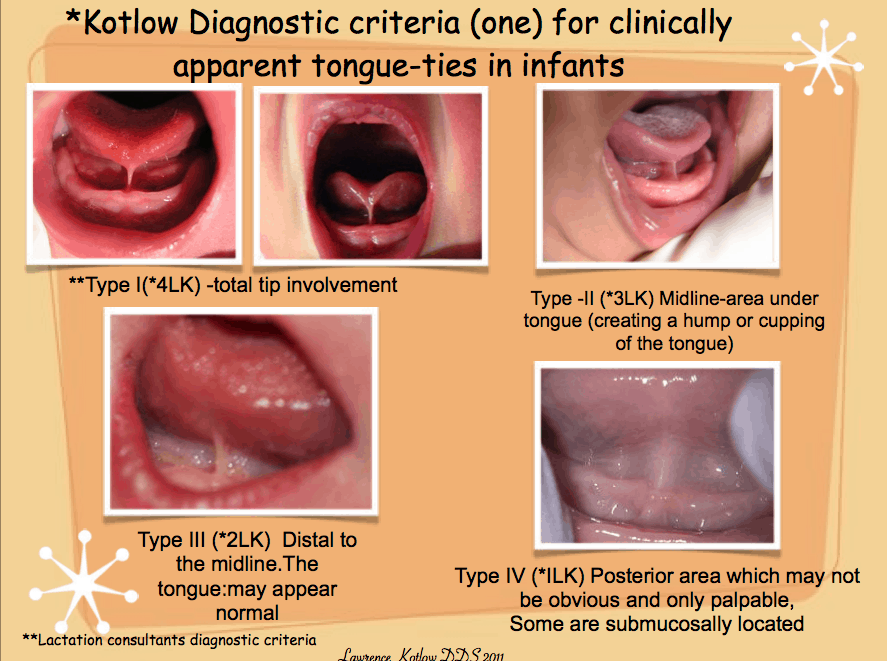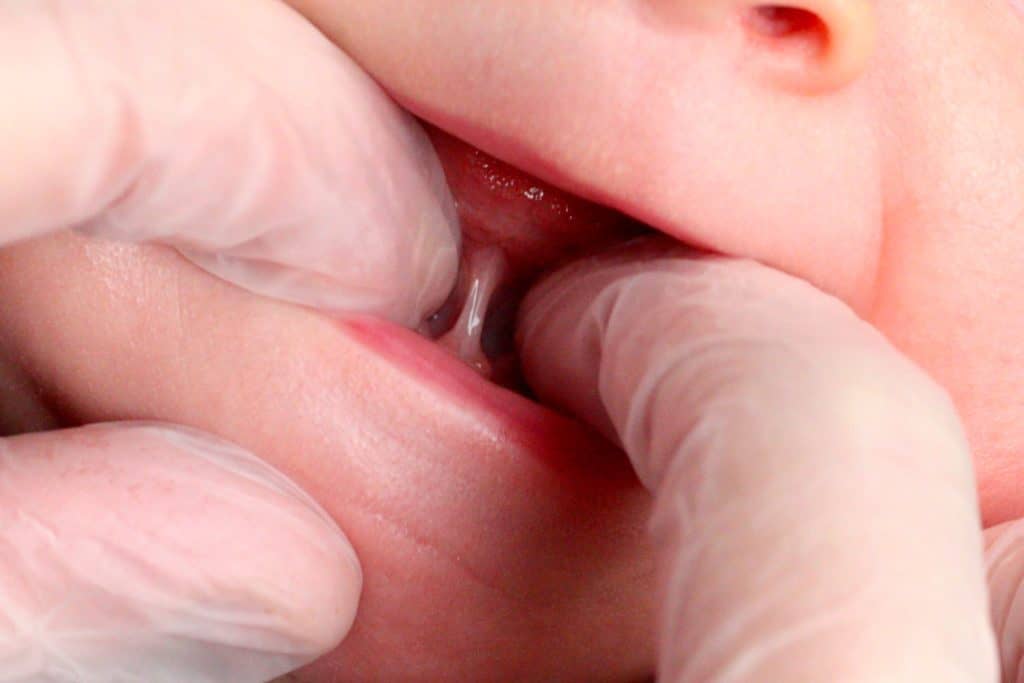I am so happy to have the opportunity to do this guest post from Melanie Henstrom IBCLC, BS. I have known Melanie for several years now and have learned a tremendous amount from her about tongue and lip ties. I see tongue and lip ties in a VERY HIGH percentage of my sleep and consulting clients. I hope this guest post from her about tongue and lip ties helps you understand more about any struggles you may be experiencing with your baby.

14 Signs Baby Has A Tongue Tie
Tongue-ties (ankyloglossia) are caused by an unusually tight band of tissue anchoring the tongue to the floor of the mouth. This restricts the tongue’s normal function, which can cause breastfeeding issues in infants, as well as speech, dental, and airway issues later on.
Tongue-ties are more common than most people think—in fact, they’re the most common problem I see in my lactation visits. Doctors and lactation consultants have known about anterior tongue-ties for years (the kind of tie that extends further toward the tip of the tongue), but are often less educated about posterior ties—the kind closer to the base of the tongue. The resulting underdiagnosis of posterior ties mean many mothers and babies continue to suffer and experience a frustrating breastfeeding relationship.
Because anterior tongue-ties are more obvious, almost no one will question an anterior tie. A posterior tie, however, can sometimes be almost invisible.
I’ve had clients come to me who have already been told definitively by their pediatrician or another lactation consultant that their child doesn’t have a tongue-tie, only to discover that a very tight posterior tie is causing their breastfeeding issues.
Even if a baby has a normal-appearing tongue, with the frenulum in the expected place—or even no frenulum at all—if they or the mother are experiencing the below symptoms, they can still have a posterior tie.
Here are the things to look for. Please remember that a baby with a tongue-tie may only have one of these signs, but they may also have many of these signs.
1. Breastfeeding hurts.
Breastfeeding is not supposed to hurt. If it does, then something is wrong. Sometimes it’s simply a latch issue—but babies that have consistent difficulty latching correctly are often experiencing this because of a tongue- and/or lip-tie. Tongue-ties and lip-ties often go hand in hand. If your baby cannot flange their upper lip over the breast, this is a sign of a lip-tie—and an indicator that a tongue-tie is likely also present.
2. Cracked, bleeding nipples.
Often, when a baby has a tongue-tie, the tongue is unable to draw the breast tissue into the baby’s soft palate, causing nipple damage from rubbing on the hard palate. Good positioning and using the ‘breast sandwich’ technique can help with this some of the time.
3. Misshapen nipples.
Often, after a feed the mother’s nipples will look like the tip of a lipstick bullet, or have a crease on the end.
4. Frustration at the breast.
A tongue-tied baby often gets frustrated at the breast, and may break latch frequently, because they are unable to transfer milk efficiently.
5. Clicking sounds while nursing.
A tongue-tied baby is often unable to form a proper seal around the breast, which results in clicking sounds as suction breaks repeatedly.
6. Too much suction.
When the tongue is dysfunctional as a result of a tongue-tie, a baby will often attempt to compensate for this by sucking harder. This excess vacuum can be exhausting for the baby, and uncomfortable for the mother. A normal “suck” is more like a wave motion of the tongue than a suck.

7. A sensitive gag reflex.
When the tongue is tethered too tightly to the floor of the mouth, the baby’s palate doesn’t receive a normal amount of stimulation, which can result in an overly sensitive gag reflex.
8. Uncoordinated sucking motion.
When you put your finger in a tongue-tied baby’s mouth, often the sucking motion will be uncoordinated and uneven, and they may break suction often. This can be frustrating for the baby, resulting in fussiness at the breast, and it can also be very exhausting, tiring baby out before getting a full feed.
9. Poor weight gain.
If mom doesn’t have a strong milk letdown, a tongue-tied baby can struggle to gain weight. If mom has a good letdown, sometimes a baby with a tongue-tie can still thrive and gain weight well—but may experience other non-weight-related symptoms (more info on that below.)
10. Digestive problems.
Because of the difficulty a tongue-tied baby has forming and maintaining a proper seal around the breast (see #5 and #8), they tend to swallow a lot of extra air, which can result in gassiness, excessive spit-up, and reflux-like symptoms.
11. Irritability or colic.
This is often related to #10, or caused by baby simply being hungry because they can’t get a full feed. Even in the absence of obvious gassiness, stomach discomfort from excess air intake can manifest itself as colic or general irritability.
12. Recessed chin.
An unrevised tongue-tie can cause a recessed chin, though some babies will have this without a tongue-tie simply due to genetics.
13. High, narrow palate.
A fully functional tongue rests against the roof of the mouth when the mouth is closed, which helps the palate develop the proper shape. A tongue-tie can prevent the tongue from resting against the palate, which can cause it to develop a high and/or narrow shape.
To breastfeed efficiently, baby needs to be able to compress the breast tissue against the roof of the mouth, and a high palate can interfere with this.
14. Reoccurring Clogged Ducts or Mastitis.
A dysfunctional tongue will have the overall result of preventing the baby from transferring milk well, and properly draining the breast. This can result in mastitis, as clogged ducts in the breast can lead to painful and potentially dangerous infections. For more info on how to recognize and treat mastitis, contact your primary care physician.
If any of the above symptoms—even just one—sound familiar to you, please see an IBCLC (Internationally Board Certified Lactation Consultant), or a pediatrician who is familiar with posterior tongue ties. Not all pediatricians or lactation consultants will be familiar enough with posterior ties to recognize or diagnose them.
All anterior ties also have a posterior component, so it’s crucial that you find a provider that knows how to laser or clip the tie completely. If the provider doesn’t revise the tongue far enough back, it will be an incomplete revision which often will not improve symptoms.
Why We Revise Tongue-Ties
Sometimes mothers and medical practitioners are hesitant to revise a tongue-tie because of the discomfort it may cause the baby, or because breastfeeding is going well enough. Here are some important things to consider if you’re on the fence:
Milk-production, at the very beginning, is hormonally-driven. Hormones present in your system stimulate the production of milk, regardless of whether or not baby is nursing, and these hormones continue to affect production to some extent for the next several weeks. Around 10-16 weeks, production begins to work almost solely on supply and demand. This means that if the baby is not transferring milk efficiently, milk supply will almost certainly begin to dip. It takes an incredible amount of work to maintain supply when a baby is inefficient at draining the breast at each feeding.
Even if a tongue-tied baby has been breastfeeding well and gaining weight during the first several weeks—usually because Mom has a exceptionally good letdown reflex—supply will often drop at the 10-16 week mark once hormones aren’t playing as big a role. Coincidentally, this is around the time a lot of mothers go back to work or start menstruating again, and so often the real issue (the tongue-tie) is masked by other factors.
Other complications that can arise from an unrevised tongue-tie (even if breastfeeding is going well):
- Difficulty swallowing solid foods when they are introduced to the diet. Gagging, choking, and tongue-thrusting motions are common with tongue-tied babies attempting to eat solids.
- Dental issues are very common with tongue-tied children, though these usually aren’t obvious until much later. A tongue or lip tie can cause spreading of the upper teeth, and prevent the jaw from developing correctly, resulting in the need for orthodontic work later in life. The underdeveloped jaw often will be weak/recessed, and not provide enough room for the adult teeth, causing crowding and recurrent decay issues.
- Speech problems are common among children with unrevised tongue-ties, as their tongues are unable to achieve the full range of motion necessary to create the proper sounds.
- Back pain. Believe it or not, a tightly tethered tongue can cause tightness in the muscles of the jaw, face, and neck, which creates kind of domino effect throughout the body (remember, everything is connected), resulting in poor posture and lifelong back pain.
- Sleep problems. The underdevelopment of the jaw can compromise the airway, resulting in sleep apnea and other disorders that can affect your child’s sleep throughout their life.
There are many reasons to address a baby’s tongue-tie, even if breastfeeding is going well. If you’re struggling to breastfeed, if baby is having a hard time gaining weight, or if you’re experiencing any of the above symptoms, please see a specialist that can properly diagnose both an anterior and a posterior tongue-tie. The results of a proper tongue-tie revision can be truly life-changing.

As a young girl, Melanie developed a passion for the birth world watching her father deliver babies. After she received her BS, she worked in adoption until she had her first child. She then became a stay at home mom for 16 years raising her 6 children. She breastfed them all, including tandem nursing her twins. Once all her children were in school, she became certified as a postpartum doula mainly serving families with twins, and triplets. A few years later she went back to school to become an IBCLC, International Board Certified Lactation Consultant. She has served over a thousand mothers and babies over the course of several years as a postpartum doula, and lactation consultant.
It has been her experience that many mothers do not have the resources to become successful at breastfeeding. She has extensive training and experience with tongue ties, and is able to educate mothers to make the right choice for their baby. She is also trained in infant massage, rhythmic movements, and craniosacral therapy. Her passion is to educate, nurture, and support new moms and babies through their breastfeeding struggles in a non-judgmental and compassionate way. Her reviews alone speak to how she has helped save breastfeeding for so many.
For more information about tongue ties here is a great resource: Tongue Tie Release Info
To find a qualified provider near you, please visit The Tongue-Tie and Lip-Tie Support Network, your states Facebook Tongue Tie group, or www.DrGhaheri.com.
Baby Bonds is a Boise-based company that offers home, clinic, and virtual consults.

Have questions about your baby? www.TheEarlyWeeks.com or contact us HERE.
The content contained in this blog is for informational and educational purposes only. It is not intended as medical advice or to replace the advice of any medical professional. It is based on our opinions and experience working with newborns and their families. Other’s opinions may vary. It does not represent the views of any affiliated organizations. The reader understands that the term “Babynurse” is often a word used to describe a newborn caregiver. However, unless otherwise disclosed, we are not licensed nurses in any state. By reading and/or utilizing any information or suggestions contained in this blog, the reader acknowledges that we are not medical professionals and agrees to and waives any claim, known or unknown, past, present or future. This blog may contain affiliate links.
© 2020 Bishop Enterprises, LLC All Rights Reserved
